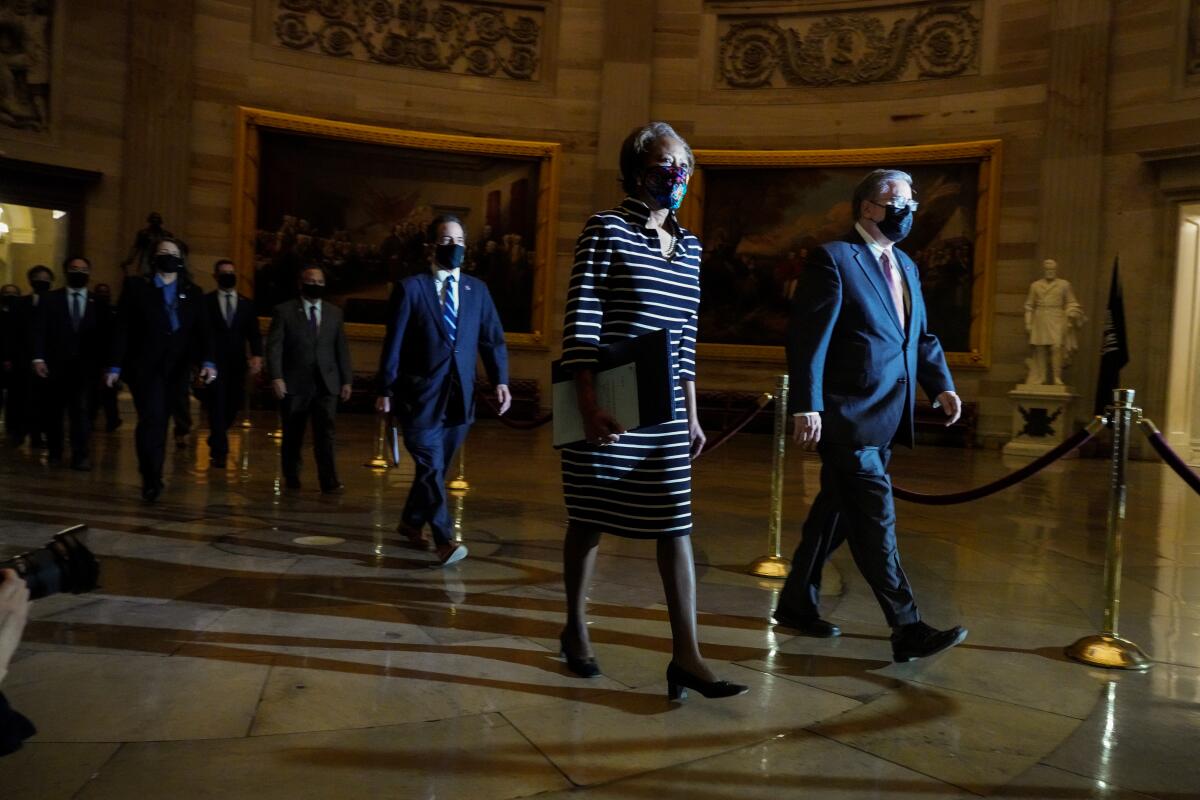House delivers Trump impeachment article to Senate, triggering unprecedented trial

- Share via
WASHINGTON — Democrats marched the impeachment case against Donald Trump to the Senate on Monday night for the start of his historic trial, but Republican senators were easing off their criticism of the former president and shunning calls to convict him over the deadly siege at the U.S. Capitol.
It’s an early sign of Trump’s enduring sway over the party.
The House prosecutors delivered the sole impeachment charge of “incitement of insurrection,” making the ceremonial walk across the Capitol to the Senate. But Republican denunciations of Trump have cooled since the Jan. 6 riot. Instead Republicans are presenting a tangle of legal arguments against the legitimacy of the trial and questions about whether Trump’s repeated demands to overturn Joe Biden’s election really amounted to incitement.
What seemed for some Democrats like an open-and-shut case that played out for the world on live television, as Trump encouraged a rally mob to “fight like hell” for his presidency, is running into a Republican Party that feels very differently. Not only are there legal concerns, but senators are wary of crossing the former president and his legions of followers who are their voters. Security remains tight at the Capitol.
Sen. John Cornyn (R-Texas) asked if Congress starts holding impeachment trials of former officials, what’s next: “Could we go back and try President Obama?”
Besides, he suggested, Trump has already been held to account. “One way in our system you get punished is losing an election.”
Chief Justice John G. Roberts Jr. is not expected to preside at the trial, as he did during Trump’s first impeachment. Instead, Sen. Patrick Leahy (D- Vt.), who serves in the largely ceremonial role as president pro tempore of the Senate, is expected to preside because Trump is no longer in office, according to a person granted anonymity to disclose the planning.
Trump is the first former president to face an impeachment trial, and it will test his grip on the Republican Party as well as the legacy of his tenure, which came to a close as a mob of loyal supporters heeded his rally cry by storming the Capitol and trying to overturn President Biden’s election.
On eve of House delivery of impeachment article to Senate, Republicans contest need to try Trump.
For Democrats the tone, tenor and length of the upcoming trial, so early in Biden’s presidency, pose their own challenge, forcing them to strike a balance between their vow to hold Trump accountable and their eagerness to deliver on the new administration’s priorities following their sweep of control of the House, Senate and White House.
Senate Majority Leader Charles E. Schumer (D-N.Y.) said Republicans appear more eager to argue over trial process than the substance of the impeachment case against Trump, perhaps to avoid casting judgment on the former president’s “role in fomenting the despicable attack” on the Capitol.
He said there’s only one question “senators of both parties will have to answer before God and their own conscience: Is former President Trump guilty of inciting an insurrection against the United States?”
Failing to conduct the trial would amount to a “get-out-of-jail-free card” for other officials accused of wrongdoing on their way out the door, Schumer said.
Arguments in the Senate trial will begin the week of Feb. 8.
Leaders in both parties agreed to the short delay to give Trump’s team and House prosecutors time to prepare and the Senate the chance to confirm some of Biden’s Cabinet nominees. Democrats say the extra days will allow for more evidence to come out about the rioting by Trump supporters, and Republicans hope to craft a unified defense for Trump.
An early vote to dismiss the trial probably would not succeed, given that Democrats now control the Senate. Still, the mounting Republican opposition indicates that many GOP senators would eventually vote to acquit Trump. Democrats would need the support of 17 Republicans — a high bar — to convict him.
Federal authorities are examining a number of threats aimed at members of Congress as the second impeachment trial of President Trump nears.
When the House impeached Trump on Jan. 13, exactly one week after the siege, Sen. Tom Cotton (R-Ark.) said he didn’t believe the Senate had the constitutional authority to convict Trump after he had left office. On Sunday, Cotton said, “The more I talk to other Republican senators, the more they’re beginning to line up” behind that argument.
“I think a lot of Americans are going to think it’s strange that the Senate is spending its time trying to convict and remove from office a man who left office a week ago,” Cotton said.
Democrats reject that argument, pointing to an 1876 impeachment of a secretary of war who had already resigned and to opinions by many legal scholars. Democrats also say that a reckoning of the first invasion of the Capitol since the War of 1812, perpetrated by rioters egged on by a president who told them to “fight like hell” against election results that were being counted at the time, is necessary so the country can move forward and ensure such a siege never happens again.
A few GOP senators have agreed with Democrats, though not close to the number that will be needed to convict Trump.
Sen. Mitt Romney (R-Utah) said he believes there is a “preponderance of opinion” that an impeachment trial is appropriate after someone leaves office. But Romney, the lone Republican to vote to convict Trump when the Senate acquitted the then-president in last year’s trial, appears to be an outlier.
Sen. Mike Rounds (R-S.D.) said he believes a trial is a “moot point” after a president’s term is over, “and I think it’s one that they would have a very difficult time in trying to get done within the Senate.”
The House will send the article of impeachment to the Senate on Monday. A trial will take place two weeks later.
Senate Republican leader Mitch McConnell, who said last week that Trump “provoked” his supporters before the riot, has not said how he will vote.
Trump’s supporters invaded the Capitol and interrupted the electoral count as he falsely claimed there was massive fraud in the election and that it was stolen by Biden. Trump’s claims were roundly rejected in the courts, including by judges appointed by Trump, and by state election officials. Five people died in the riot, including a Capitol Police officer.
Cotton appeared on Fox News Channel’s “Sunday Morning Futures” and Romney was on CNN’s “State of the Union” and on “Fox News Sunday.” Rounds was interviewed on NBC’s “Meet the Press.”
More to Read
Get the L.A. Times Politics newsletter
Deeply reported insights into legislation, politics and policy from Sacramento, Washington and beyond. In your inbox three times per week.
You may occasionally receive promotional content from the Los Angeles Times.













